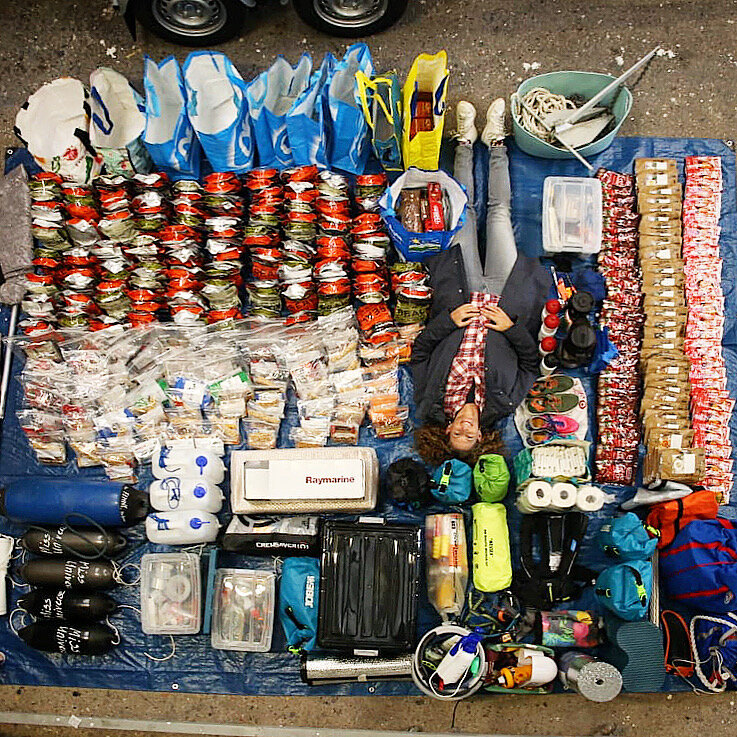Gabi Schenkel was only the4th woman in the world that finished the Talisker Atlantic Challenge solo. She started rowing on December 12 2019 in La Gomera and arrived on February 25 2020 in Antigua. That’s 5282kms in 74 days. I wanted to find out what it takes to finish such a challenge and of course how Gabi planned and executed her performance.
Athletes often check out a race course on Google maps. When Gabi Schenkel does that to get a glimpse of the Talisker Atlantic Challenge, she keeps zooming out so long that the map switches from 2D to 3D… I guess one can tell, she’s in for the long run.

Actually, the long run is something the charismatic osteopath from Wädenswil (Zurich) knows all too well. She’s been running ultra-marathons and trail runs for many years and understands how to push her body and her mind beyond what seems possible.
It strikes me how unpretentious and relaxed Gabi approaches an unfathomable task like the Atlantic Challenge. She first decided to do this race and then only started with rowing in summer 2018. This makes this achievement even more mind-blowing.
After countless hours on the lake of Zurich to learn proper rowing skills, she also practised a lot with the Dutch manufacturer of her boat. Her vessel for crossing the Atlantic has not much in common with the regular skiff and resembles more a James Bond submarine.

The boat comprises a narrow cabin to sleep, solar panels to power various tracking devices, telecommunication, a little desalination machine and of course a cooker to prepare warm meals from dried expedition food.
To me, nutrition was of particular interest. The race rules require 60 kcal per kg body weight/day, in her case 3600kcal/day. Gabi told remembers that this didn’t help much. First she got seasick and then fell really ill and had to take antibiotics for a few days. She wasn’t able to stick to her race plan and was coasting along for several days, sleeping 10 hours a day, trying to recover.
Her Ultra-experience lets her deal with curveballs like these in a much controlled way. Trust your body and listen carefully, what he tells you, she says, and then of course setbacks like this force you to face your personal truth. Do I quit the very moment I missed my actual goal or do I keep going because I know, I do my very best every day and that’s what counts all along? Competing in Ultras always comes down to a spiritual side if things. It seems like there are no boundaries to what a human body can achieve, when you are in tune with your mind. This might be the reason why so many athletes turn to these massive racesto better connect with oneself.
For Gabi the biggest reason to go to the extremes is to be as close to nature as you can be. Every time she toes the line, she doesn’t really know what to expect, but it always comes down to an exhilarating journey to natureincluding her own nature.
She reminisces of special encounters out on the sea with a whale coming past her little boat, with birds and dolphins. There’s a certain connection with nature’s creaturesalmost like you need to disconnect from the frenzy of the modern world to build new connections to our roots.
Gabi knows, Ultra is not for everyone. She gets dismissive comments from strangers about her endeavours often but ignores doubters. If I can inspire and encourage only a few to get active and become more accountable for their own actions, I’m very happy. These values are a red thread through Gabi’s life. She dedicated her performance to Ocean Care, an organization committed to marine wildlife protection as well as Plastic Patrol, a UK based organization committed to reducing the amount of plastic in waterways. Her passion next to being all outdoorsy is osteopathy and helping others overcome their issues. And after the long break she took to row across the Atlantic, she will reopen her practice.
After overcoming her initial health issues in the race, she could execute the race to a T. One major success factor for her was recovery: she slept a minimum of 68 hours every night and spent a lot of time self-care, massaging her arms and hands daily and taking extra care of irritated skin from her boat’s seat or the oars. Cooking a meal every day with desalinated water and eating of it throughout the day nourished her and to top it off she used a customized micronutrient supplement from LOEWI. They must have figured out the secrete sauce for Gabi: 74 days without any cramps, no excess fatigue and never a day of DOMS while covering 5070km’s per day in 1214 hours speaks for itself.

She finished the race after two and a half months and lost a mere 5.4kg of body weight. This is astonishing, even more so, since she had bigger losses midway, after being sick and then recovered along the way.

I’m overwhelmed with the current media attention I get. I’m not used to this and especially after spending such a long time on my own, it will take some time, until I arrive back in society and it all sinks in better, Gabi says. I don’t think I am special, nor have I done anything impossible. I think barriers exist only in our heads. It must be this unbelievable spirit or the humility of her that is so catching, meanwhile she has an eye on her computer, eagerly waiting to find out if she made it on the competitor list of a 246km ultra-marathon in Greece.




